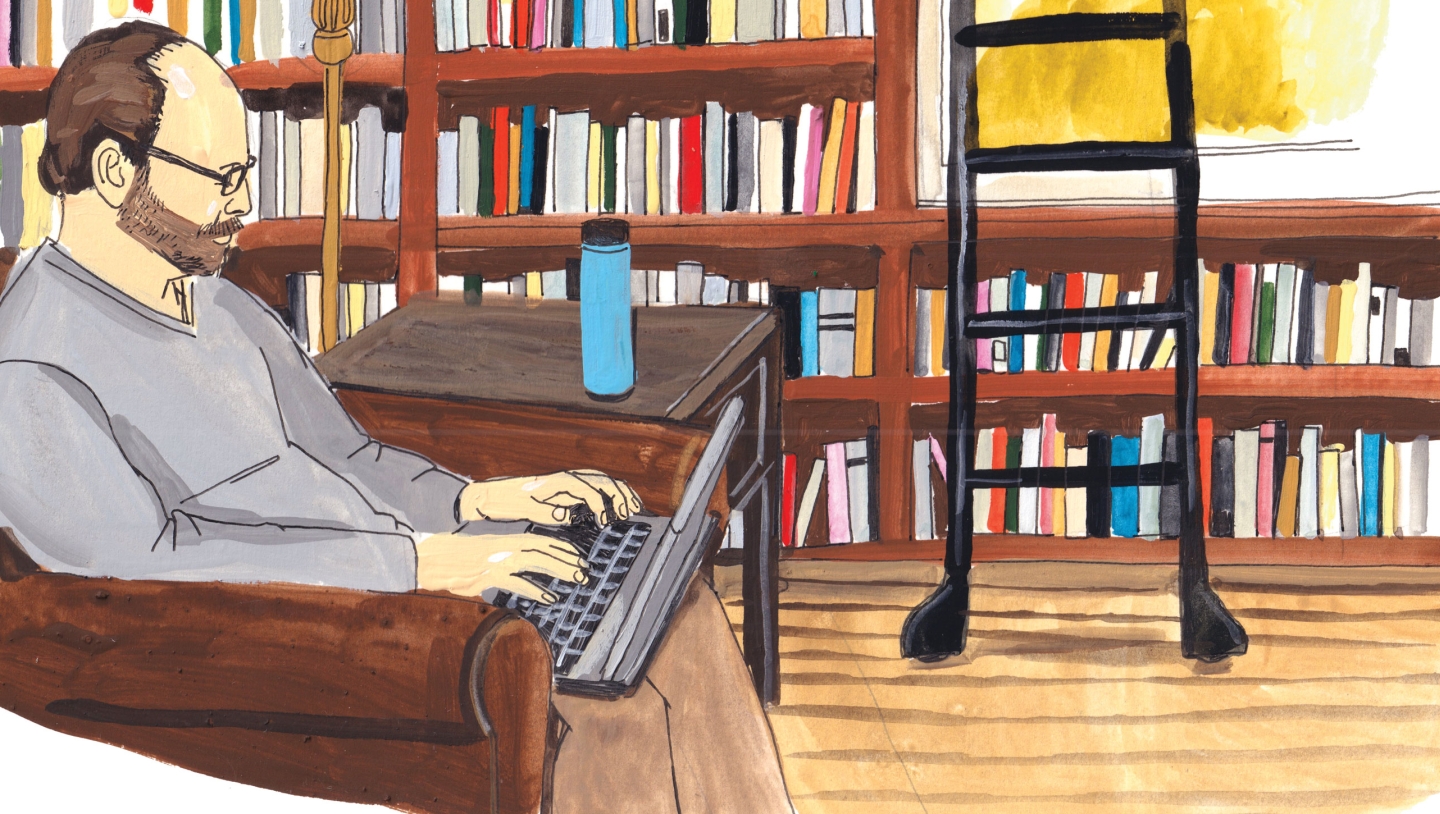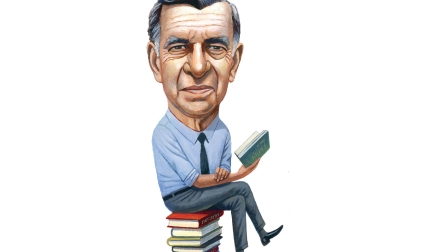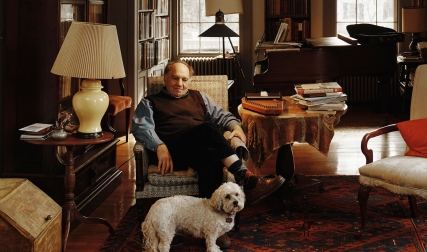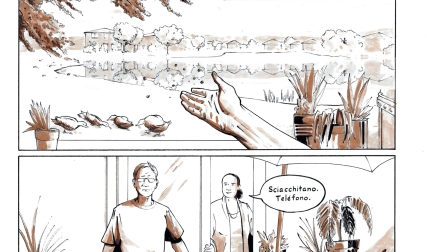Illustrations by Julia Rothman

Bee Sacks ’08
My writing routine was extremely rigid when I was younger. I felt that if I hadn’t written my pages by 10 a.m., the day was a wash. It was probably effective that my entire sense of self was bound up in those morning pages. But it was hard. These days, I’m trying to maintain my discipline but soften it with a certain amount of forgiveness.
I try to find joy and pleasure in the process. I do a lot of writing by hand, and I allow myself the indulgence of nice instruments: Kaweco sport pens, Lamy fountain pens, Pilot pens. I’ll use bottles of ink and a certain paper that I really like, such as Tomoe River Paper. It’s not that I think these items have a special magic. It’s just that if I allow myself to indulge a little to aestheticize my writing, I enjoy it more.
I’ll hang up a clothesline, and then I use miniature paper clips to hang the handwritten pages on the line. I’ll shift everything around and maybe insert index cards with one or two sentences. By the end of a day, my wall is almost like a kind of patchwork quilt of all these different papers and colors.
I once heard Joyce Carol Oates refer to word processing as making us all addicted to a certain kind of perfection, meaning you can just keep moving around the same sentence forever. But if I break out of the screen, if I am writing by hand—it gives me more stamina and bravery to not just retool my drafts but reimagine them.
Sacks, who wrote City of a Thousand Gates (2021) and The Lover (2023), lives in Los Angeles.

Margaret Wilkerson Sexton ’04
For my first three books, I wrote directly on a laptop. Recently, novelist Lauren Groff came to our M.F.A. program. She writes longhand, and Toni Morrison, who is the queen of my writing heart, also wrote longhand. She once said to a colleague of hers, “Can you tell the difference between the writers who write on the computers and the writers who write longhand?” And the colleague said, “No, what’s the difference?” Morrison replied: “Well, the ones who do longhand are better.” I’ve internalized that, so I’m trying longhand right now for my fourth book. I’ve written every-
thing so far, probably about 200 pages, longhand first. I’m just filling up these notebooks and then typing everything into the computer.
Sexton is the author of three novels, including On the Rooftop (2022). She lives in Oakland, California, and teaches in the M.F.A. program at St. Mary’s College.
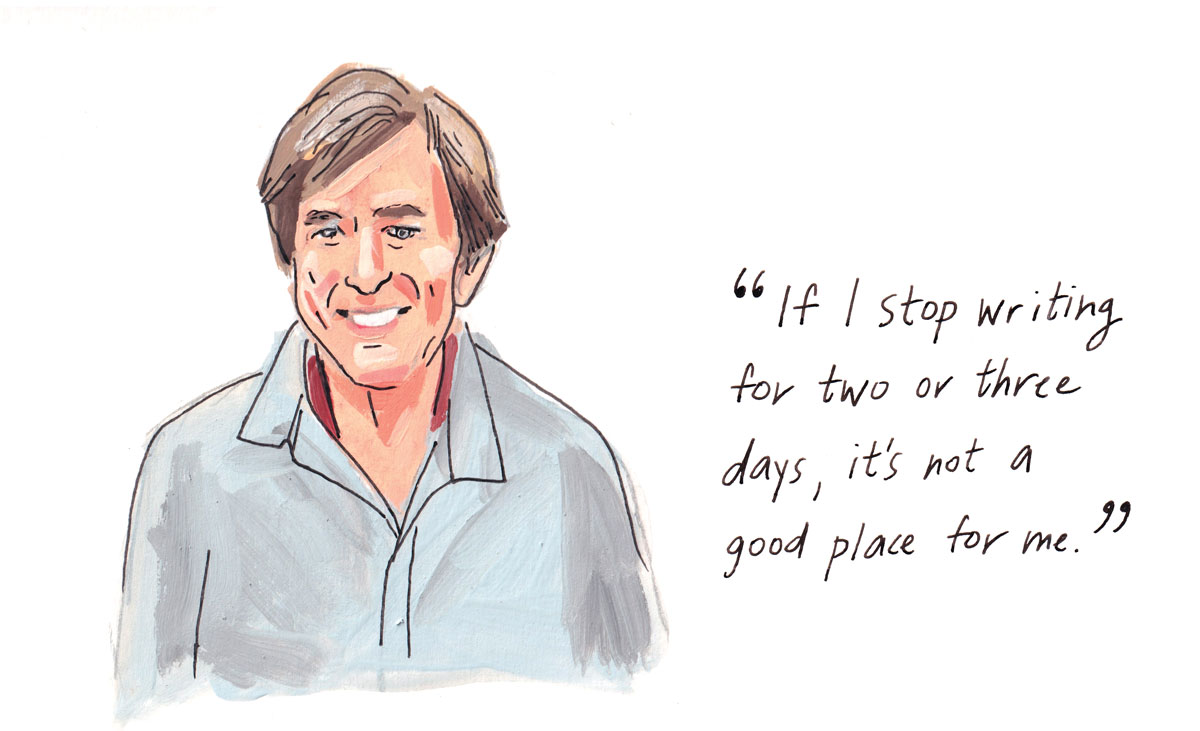
Peter Stark ’76
Every successful writer is a disciplined writer. My ideal routine is to get up, maybe make a cup of coffee, and go straight to my desk. I stay there until I finish writing for the day, with exceptions for food, bathroom breaks, and caffeine breaks. It might be three hours—four is probably the max I would do in one sitting. If I stop writing for two or three days, it’s not a good place for me, psychologically and emotionally. When I get back to the writing, even after just two or three days, I immediately feel centered again.
Stark is the author of nine nonfiction books, including Gallop Toward the Sun: Tecumseh and William Henry Harrison’s Struggle for the Destiny of a Nation (2023). He lives in Missoula, Montana.
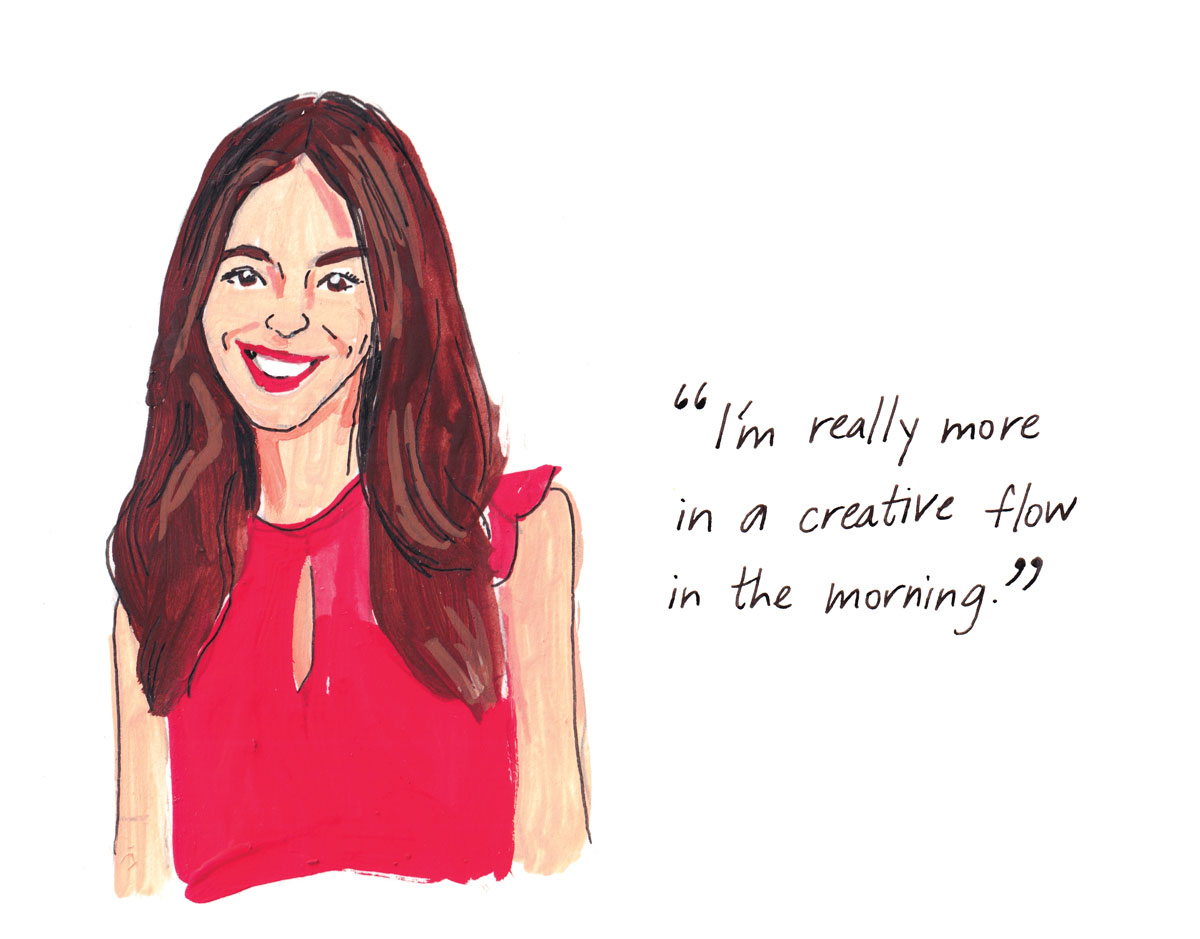
Lindsay MacMillan ’16
When I worked at Goldman Sachs in New York, I lived a little bit of what I call my Hannah Montana double life. I would wake up before 5 in the morning and go to the Starbucks across from my office when it opened. I would write for about two hours every day before work. But then of course I had ideas floating up in the middle of the day, so I would just keep my notes app open on my phone and dump ideas there during bathroom breaks or coffee breaks at the office.
I didn’t leave my day job at Goldman Sachs until a couple of months before the first book came out. Nowadays, I still do a morning writing session because I’m really more in a creative flow in the morning. I keep my phone and computer on airplane mode when I wake up—I don’t check anything. Just as some people need to get their workout in before work, I need to get my writing session in or I just feel off.
MacMillan is the author of The Heart of the Deal (2022) and Double-Decker Dreams (2023). She lives in Los Angeles.
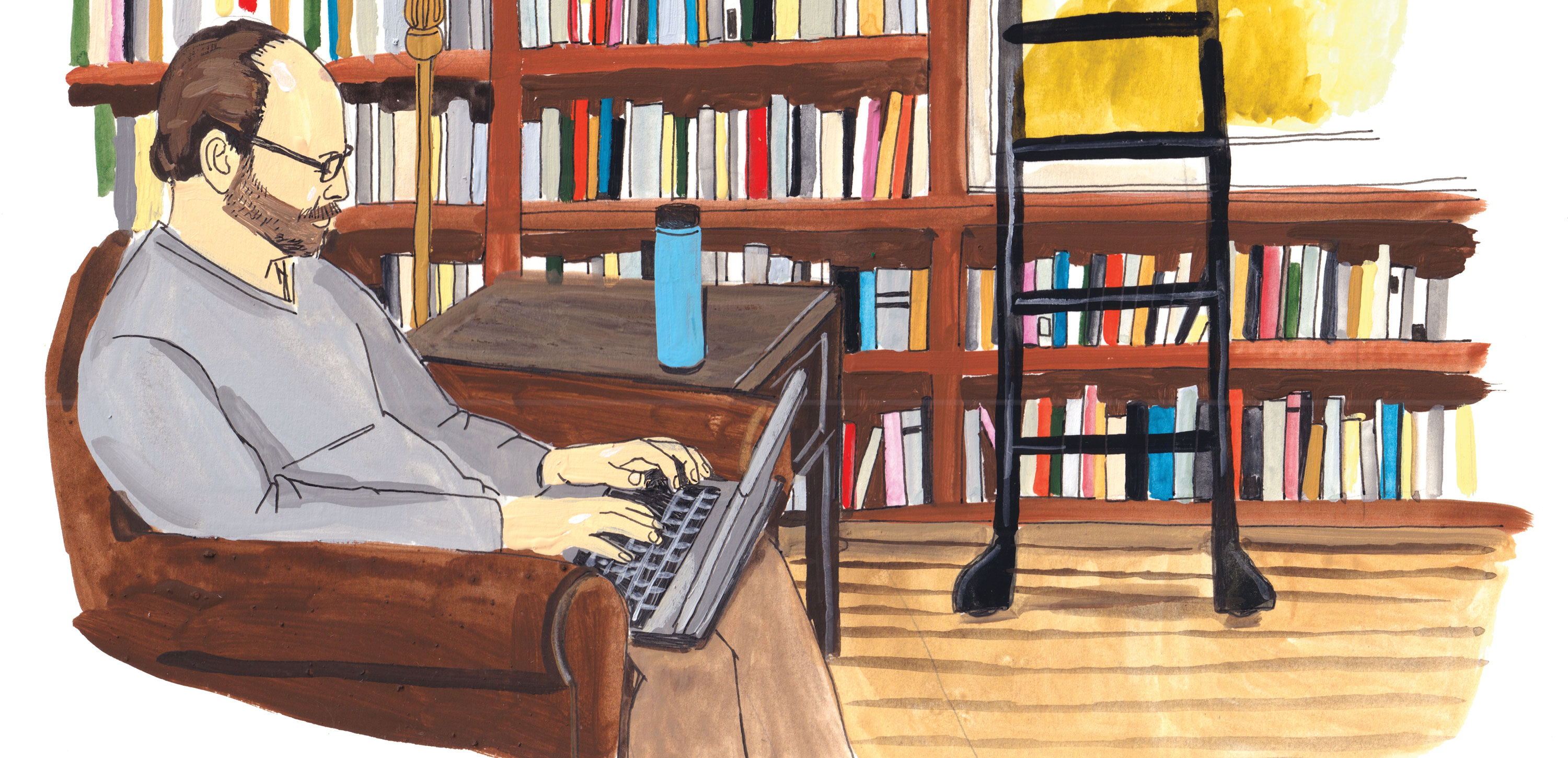
Brad Parks ’96
Right now, my writing spot is the library at the school where my wife works. I have this little chair—a leather chair that looks very much out of place in this library, but everybody knows it’s sort of my chair. I always say anybody can use it if they want to—they just have to beat me there in the morning, and I get there at about 5:30.
A typical day is roll out of bed, get to my chair, write until the words don’t make sense anymore, and then I’m kind of done. Usually, it’s about four hours. I’m a thousand-words-a-day guy, minimum. If you do that with discipline, you have a draft in roughly three months.
I write on a 17-inch laptop with as large a keyboard for my fumbly fingers as I can possibly get. It’s technically a gaming laptop. I bought it because it literally has the largest battery you are legally allowed to sell in the United States. There are times when I’m away from my chair and therefore away from a plug—I might walk up on a hill somewhere and write. I need good, long battery life.
When I am in the chair, I’m earning my money. I almost treat myself like an athlete in season, where I’m trying to eat right and sleep well. I’m trying to be the best human being I can be when I slide into that chair. Because I work six days a week, I’m scared to take more than one day off because I feel like I’m going to lose the flow of the story. I guess I’ve scared myself into staying productive.
Parks is the author of 15 mystery novels and thrillers, including Unthinkable (2021) and Interference (2020). He lives in Marin County, California.

Frances Cha ’07
There’s really no typical day. When I was working on my first book, I would be able to get babysitters at random times. So whenever that would be, I would take either my writing pad or laptop and bolt out of there. Or I’d go to the laundry room. That was my process: just snatches of time whenever I could find them. And training myself to sit down and write whenever, wherever.
Now that the kids are slightly older, I prefer to write the minute they leave the house. Ideally, I would start writing in the morning. I really can’t write in the afternoon or the evening as much. Silence in the house is my ideal writing environment. When my husband works from home or my mom’s visiting or the kids have school off, nothing gets done.
Cha’s debut novel, If I Had Your Face, was published in 2021. She resides in Westchester County, New York, and teaches at Columbia University in the M.F.A. program.
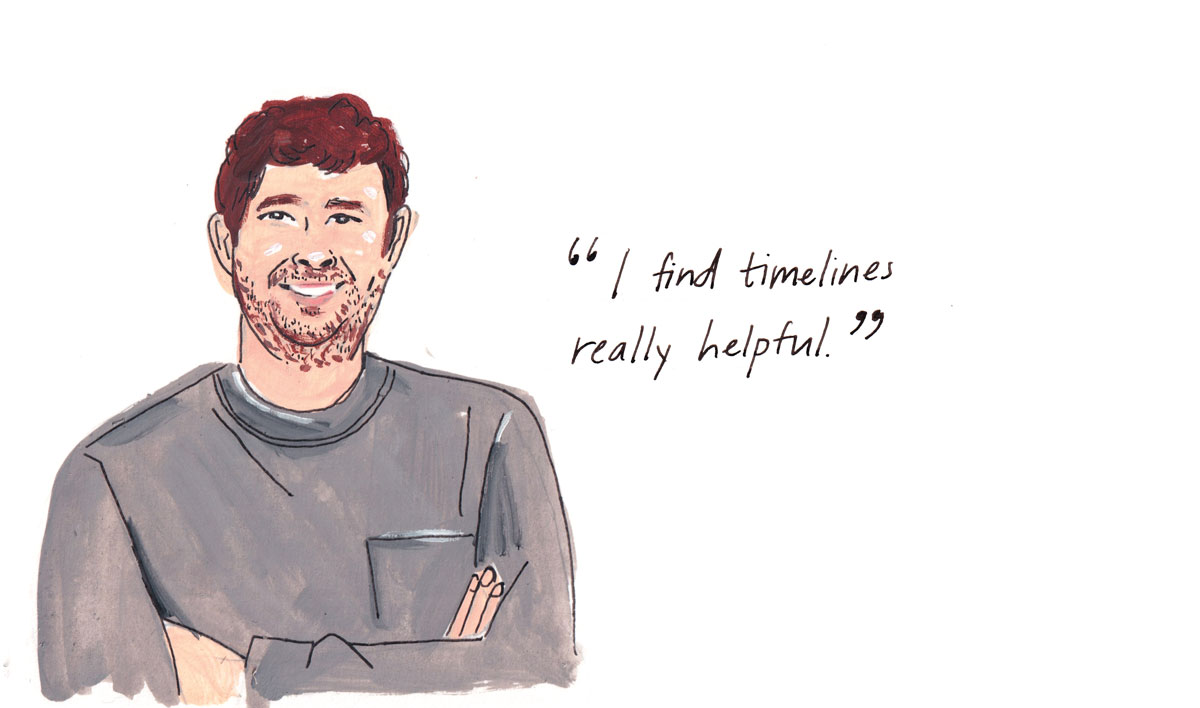
Morgan Talty ’16
I used to be a morning writer. There’s something about the morning where it feels like nobody else exists. But it’s all a matter of tricking your mind into thinking a certain way. And now I can do that at lunchtime. Or I can do that in the evening when my son goes to bed. I work from my laptop, but I also will use pen and paper to keep track of things. I find timelines really helpful. With Fire Exit, I taped together four pieces of printer paper, and I had a timeline that went all the way across the front and back of each page to keep track of when things were happening, because there was so much stuff going on.
Talty’s debut story collection, Night of the Living Rez, was published in 2022, and his first novel, Fire Exit, came out in June. He lives in Maine and teaches English at the University of Maine.

Stuart Reid ’08
I’m a huge outliner. I had an extremely detailed outline of my whole book. It changed frequently, and things dropped off and moved around and were added, but that meant that when I was faced with a blank page, I could look at the outline. And so I knew, “Okay, today’s task is not the general scary task of ‘work on the book,’ it’s ‘describe the setup to the August 18th meeting,’ ” or something specific like that. Breaking it down into chunks makes it much more manageable, and an outline is crucial for that.
Reid’s The Lumumba Plot: The Secret History of the CIA and a Cold War Assassination came out last year. He lives in Montclair, New Jersey.

Snowden Wright ’04
I wake up and do my best writing over those first couple cups of coffee. This pattern started back when I still had a day job. To be able to get my writing in, I would wake up at 5 in the morning and write for an hour until I hit some sentence that wasn’t singing, some transition that wasn’t smooth enough. And then I would go for a run. I’ve always been a big runner. I’ll be running along playing out this sentence or this scene or this transition in my head, rewriting it over and over again as I run until I get it just right.
On my farm there’s this older house that I’ve turned into a writing studio, about a mile away from the main house. My favorite part of the day is when I’m walking the mile across the farm in the morning with my dog Delta. She gets her walk, then she hangs around, swims in the pond, messes with the cows—things like that while I work. And then we walk home. That walk is very conducive to the non-direct form of writing.
I’m very privileged to write full time now, but when people hear that, they think I’m sitting at my desk for eight hours a day. I only have three or four hours of good writing in me. If I’m writing a historical novel, then each day I’ll put in a couple of hours of research. I like to do a lot of reading—it keeps my brain working, keeps my brain in writer mode, where I’m seeing how other authors do it and seeing what I could borrow from that.
Wright’s new novel, The Queen City Detective Agency, will be published by HarperCollins in August. He previously wrote American Pop (2019) and Play Pretty Blues (2013). He lives in Yazoo County, Mississippi.
